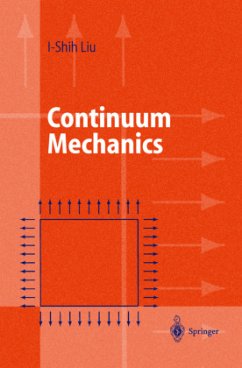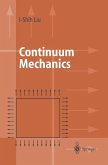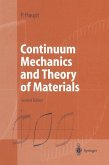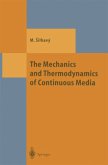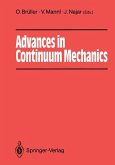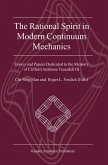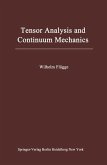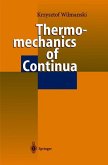In this book the basic principles of continuum mechanics and thermodynam ics are treated in the tradition of the rational framework established in the 1960s, typically in the fundamental memoir "The Non-Linear Field Theories of Mechanics" by Truesdell and Noll. The theoretical aspect of constitutive theories for materials in general has been carefully developed in mathemati cal clarity - from general kinematics, balance equations, material objectivity, and isotropic representations to the framework of rational thermodynamics based on the entropy principle. However, I make no claim that the subjects are covered completely, nor does this book cover solutions and examples that can usually be found in textbooks of fluid mechanics and linear elasticity. However, some of the interesting examples of finite deformations in elastic materials, such as biaxial stretching of an elastic membrane and inflation of a rubber balloon, are discussed. In the last two chapters of the book, some recent developments in ther modynamic theories are considered. Specifically, they emphasize the use of Lagrange multipliers, which enables the exploitation of the entropy principle in a systematic manner for constitutive equations, and introduce some basic notions of extended thermodynamics. Although extended thermodynamics is closely related to the kinetic theory of ideal gases, very limited knowledge of kinetic theory is needed.
From the reviews: "The strength of the book lies in the presentation of a very general and rational framework for constitutive formulations and the role thermodynamics plays in these formulations. [...] Continuum Mechanics is recommended more as a reference book for students and researchers in applied mechanics and structural mechanics [...] The text is also recommended as a textbook for students in the fields of theoretical physics and applied mathematics for which a more rational framework of continuum mechanics is required." (Applied Mechanics Review, 56/3, 2003) "It is probably a pleasure for all scientists working in the field of continuum mechanics to have a new book by hand which gives a compact and modern introduction into continuum mechanics and thermodynamics and which is enhanced with numerous examples and exercises. ... the book can be recommended to senior undergraduates and graduate students at the master and PhD level as well as to research scientists and teachers." (Technische Mechanik, Vol. 25 (2), 2005) "This book contains a modern presentation of the basic principles of continuum mechanics ... together with an introduction to the basic ideas of rational extended thermodynamics. ... The book is self-contained, since the appendix contains all relevant material and notation of tensor analysis which is needed in the book. ... the unified treatment of both rational continuum mechanics and extended thermodynamics is a novelty and renders the book a useful didactic tool." (Paolo Cermelli, Mathematical Reviews, 2005 c) "The book under review has been written and used in conjunction with an introductory course on continuum mechanics ... . Each chapter has examples and exercises to supplement the basic material. ... this is a compact well-written textbook on continuum mechanics, with a strong emphasis on thermodynamics." (Cornelius O. Horgan, SIAM Reviews, Vol. 45 (2), 2003) "This book is intended primarily as a textbook for graduate students and advanced undergraduate students in theoretical physics, applied mathematics, and engineering sciences. The text can also serve as a reference book for students and researchers in the fields of applied and structural mechanics. ... The strength of the book lies in the presentation of a very general and rational framework for constitutive formulations and the role thermodynamics plays in these formulations. ... In summary, Continuum Mechanics is recommended ... ." (E. DeSantiago, Applied Mechanics Reviews, Vol. 56 (3), 2003)

